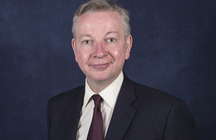Michael Gove – 2014 Statement in Response to the Narey Report
The statement made by Michael Gove, the then Secretary of State for Education, on 13 February 2014.
Children’s social work is one of the most demanding careers a person can pursue, with the power to transform the lives of deeply disadvantaged children. It requires a unique and highly complex set of skills and knowledge. When those skills and that knowledge are not present, lives which might have been transformed immeasurably for the better can be left damaged instead.
Today we publish an independent report, by former Barnardo’s chief executive Sir Martin Narey, which reveals a training system which in too many universities is not fit for purpose. He concludes that entry demands are not high enough, the system of endorsement of courses is insufficiently rigorous, and the content of those courses too generic. The result is a failure to protect the most vulnerable children in our society.
While Sir Martin stresses that some fine social work courses do exist, in too many universities and in many social work texts, social work training can be dominated by an emphasis on inequality, empowerment and anti-oppressive practice. As Sir Martin Narey says, “sometimes, parents and other carers neglect and harm children. In such circumstances, viewing those parents as victims, seeking to treat them non oppressively, empowering them or working in partnership with them can divert the practitioner’s focus from where it should be: on the child.”
Sir Martin argues that there is too much theory, not enough good practical experience. Training for children’s social work ought to include: recognition of the signs of abuse, understanding of the impact of child abuse and neglect in very early years and beyond, assessment and analytical skills, training in how to question and engage parents and children, a sound knowledge of the evidence base around parental capacity and effective intervention including how to prepare a child to move home, either in an emergency or to a new permanent family, management of risk, the legal framework, and child development. To learn how to apply this knowledge in practice, training must always include a placement in a statutory setting.
Sir Martin reveals there are some good undergraduate courses, and there are many better masters-based entry routes – but too many social workers are leaving university today ill-prepared for their vital role working to protect at risk children.
Children’s social work requires a uniquely fine balance of moral, legal, practical and psychological considerations; challenge as well as support; a hard intellect as well as a generous heart.
Too many prospective social workers, as Sir Martin also reports, are entering university ill-equipped to meet those demands. Between 2003 and 2012, no fewer than 307 social work degree courses at 83 institutions were formally approved, with a rapid increase in the number of entrants and worryingly low entry standards: less than a third of those on undergraduate courses had one or more A levels. The failure rate on these courses was just 2.5%. We want to see universities demand more of prospective social workers.
We accept Sir Martin’s recommendation to set out, in one place, what a newly qualified children’s social worker needs to understand, based first on a definition of what a children’s social worker is, work which is being led by the Chief Social Worker for Children, Isabelle Trowler. And we want to see university students committed to working with children specialise in children’s issues both academically and in their practice placements.
The Chief Social Worker is also developing plans for the introduction of a more rigorous testing regime for children’s social workers, including a license to practice examination, continuing professional development and compulsory revalidation; and I am personally supportive of this work.
The Frontline and Step Up to Social Work programmes are leading the way in increasing the ambition of children’s social work; more traditional entry routes must, at all universities, have similar aspiration. We want to do for social work what has been done so successfully for teaching: raise the status of the profession and the quality of those wishing to join it through higher quality entry routes and training.
The cluttered landscape of standards and university endorsement criteria should be cleared, and the criteria sharpened. We shall consider Sir Martin’s recommendations for a single body to approve and audit children’s social work training; and further consider how to strengthen regulation of the profession.
The fundamental reform of social work training recommended by Sir Martin sits alongside our existing reform programme in children’s social work: a swifter and surer adoption system, sharper intervention in inadequate authorities, diversification in delivery, and an innovation programme to encourage a wider range of partners, greater creativity, and more intelligent and supportive practice systems. What we would want for our own children, we should aim to deliver for all children.

